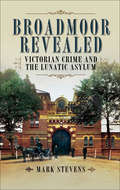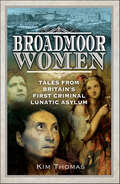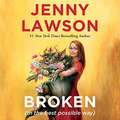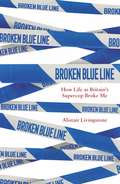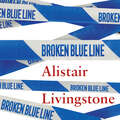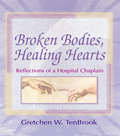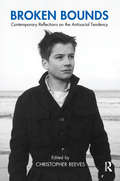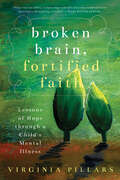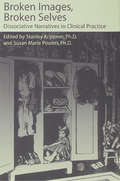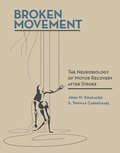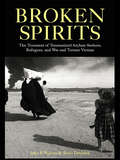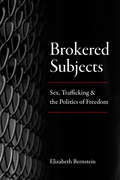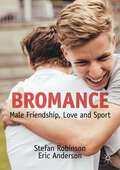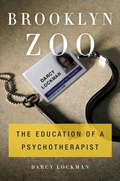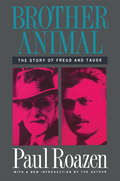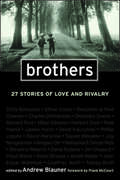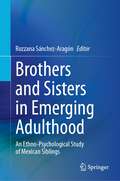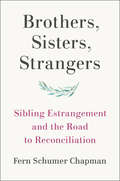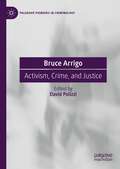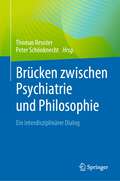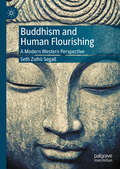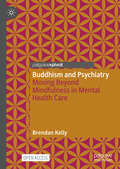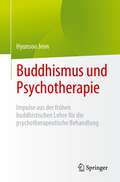- Table View
- List View
Broadmoor Revealed: Victorian Crime and the Lunatic Asylum
by Mark Stevens“A fascinating insight into the country’s most famous asylum for criminals” which reveals Victorian England’s care and management of the mentally ill (Your Family Tree).On 27 May 1863, three coaches pulled up at the gates of a new asylum, built amongst the tall, dense pines of Windsor Forest. Broadmoor’s first patients had arrived.In Broadmoor Revealed, Mark Stevens writes about what life was like for the criminally insane, over one hundred years ago. From fresh research into the Broadmoor archives, Mark has uncovered the lost lives of patients whose mental illnesses led them to become involved in crime.Discover the five women who went on to become mothers in Broadmoor, giving birth to new life when three of them had previously taken it. Find out how several Victorian immigrants ended their hopeful journeys to England in madness and disaster. And follow the numerous escapes, actual and attempted, as the first doctors tried to assert control over the residents.As well as bringing the lives of forgotten patients to light, this thrilling book reveals new perspectives on some of the hospital’s most famous Victorian residents: Edward Oxford, the bar boy who shot at Queen Victoria. Richard Dadd, the brilliant artist and murderer of his own father. William Chester Minor, veteran of the American Civil War who went on to play a key part in the first Oxford English Dictionary. Christiana Edmunds, The Chocolate Cream Poisoner and frustrated lover from Brighton.“Detailed and thoughtful.” —Times Literary Supplement“It challenges preconceptions about mental illness and public reaction to shocking crimes.” —Bracknell Forest Standard
Broadmoor Women: Tales from Britain's First Criminal Lunatic Asylum
by Kim E. ThomasBroadmoor, Britain’s first asylum for criminal lunatics, was founded in 1863. In the first years of its existence, one in five patients was female. Most had been tried for terrible crimes and sent to Broadmoor after being found not guilty by virtue of insanity. Many had murdered their own children, while others had killed husbands or other family members. Drawing on Broadmoor’s rich archive, this book tells the story of seven of those women, ranging from a farmer’s daughter in her 20s who shot dead her own mother to a middle-class housewife who drowned her baby daughter. Their moving stories give a glimpse into what nineteenth-century life was like for ordinary women, often struggling with poverty, domestic abuse and repeated childbearing. For some, Broadmoor, with its regime of plain food, fresh air and garden walks, was a respite from the hardships of their previous life. Others were desperate to return to their families. All but one of the women whose stories are recounted in this book recovered and were released. Their bout of insanity was temporary. Yet the causes of their condition were poorly understood and the treatment rudimentary. As well as providing an in-depth look at the lives of women in Victorian England, the book offers a fascinating insight into the medical profession’s emerging understanding of the causes and treatment of mental illness.
Broken (in The Best Possible Way)
by Jenny Lawson"Jenny Lawson returns to narrate her third installment in a disheveled saga of finding the light at the end of a long, winding, ludicrous tunnel.... Another treasure in the Lawson collection, this audiobook shines with a powerful message: Depression and anxiety suck, but we can rise above them." (AudioFile Magazine, Earphones Award winner) From the number one New York Times best-selling author of Furiously Happy and Let’s Pretend This Never Happened comes a deeply relatable audiobook filled with humor and honesty about depression and anxiety. *This program includes an audio-exclusive bonus chapter* As Jenny Lawson’s hundreds of thousands of fans know, she suffers from depression. In Broken (in the bests possible way), Jenny brings listeners along on her mental and physical health journey, offering heartbreaking and hilarious anecdotes along the way. With people experiencing anxiety and depression now more than ever, Jenny humanizes what we all face in an all-too-real way, reassuring us that we’re not alone and making us laugh while doing it. From the business ideas that she wants to pitch to Shark Tank to the reason why Jenny can never go back to the post office, Broken leaves nothing to the imagination in the most satisfying way. And of course, Jenny’s long-suffering husband Victor - the Ricky to Jenny’s Lucille Ball - is present throughout. A treat for Jenny Lawson’s already existing fans, and destined to convert new ones, Broken is a beacon of hope and a wellspring of laughter when we all need it most.
Broken Blue Line: How Life as Britain's Supercop Broke Me
by Alistair Livingstone'Broken Blue Line is a rollercoaster of a ride depicting the realities of twenty-first-century policing on the front-line. Its well written, honest and informative. Alistair Livingstone put his life on the line, and now he's put his heart on the line. Courageous and human. Highly recommended.'Mike Pannett, author of Now Then Lad . . . and Crime SquadAs a police officer, Alistair Livingstone was dubbed Supercop by the media for making more arrests than any other officer in the UK. But then Ali broke down. Broken Blue Line is the vividly told story of what brought him to that point, and the beginning of his slow, painful recovery.Ali was dubbed Supercop for making more than 1,000 arrests over one eighteen-month period, when the average arrest rate for officers in England and Wales is just nine a year. In his work as a police officer, he dealt with life-and-death situations on an almost daily basis: saving lives as a hostage negotiator; rescuing the occupant of a house fire; providing tactical advice during some of the most violent incidents; clinging onto a suicidal man hanging from the roof of a multi-storey car park; and entering a flat that had been blown up in an explosion just moments before. Ali was also engulfed in the aftermath and devastation of losing a colleague and friend who died doing the job she loved, and he witnessed the unprecedented response to the serial killings in Ipswich and the profound effect it had on the community and the police. But then an agonising and debilitating mental breakdown left the seemingly indestructible sergeant desperately seeking help. After almost two decades helping some of society's most vulnerable people he became so troubled by what he had seen and done in the line of duty that he hit rock bottom. Ali had no option but to walk away from the job that had defined him to embark on his biggest challenge yet: regaining his mental health. Ali's book offers an insight into the real world of modern policing: the demands and challenges faced by frontline officers throughout the UK. Ali's hope is that by opening up about his experiences and his struggle to regain his mental health in this no-holds-barred account, he will help to remove some of the lingering stigma that attaches to mental illness within the police and other professions and prevent others from making the same mistakes that he did. Ali says that he thoroughly enjoyed being a police officer and got to experience the sharp end of policing in so many different ways. When he finally made the decision to leave he was devastated and the months that followed his breakdown were the toughest he'd ever faced. Now that he is on the road to recovery, he hopes that by sharing his story it'll shine a light on the challenges of modern policing and the toll it can take, and, in doing so, to help others.
Broken Blue Line: How Life as Britain's Supercop Broke Me
by Alistair Livingstone'Broken Blue Line is a rollercoaster of a ride depicting the realities of twenty-first-century policing on the front-line. Its well written, honest and informative. Alistair Livingstone put his life on the line, and now he's put his heart on the line. Courageous and human. Highly recommended.'Mike Pannett, author of Now Then Lad . . . and Crime SquadAs a police officer, Alistair Livingstone was dubbed Supercop by the media for making more arrests than any other officer in the UK. But then Ali broke down. Broken Blue Line is the vividly told story of what brought him to that point, and the beginning of his slow, painful recovery.Ali was dubbed Supercop for making more than 1,000 arrests over one eighteen-month period, when the average arrest rate for officers in England and Wales is just nine a year. In his work as a police officer, he dealt with life-and-death situations on an almost daily basis: saving lives as a hostage negotiator; rescuing the occupant of a house fire; providing tactical advice during some of the most violent incidents; clinging onto a suicidal man hanging from the roof of a multi-storey car park; and entering a flat that had been blown up in an explosion just moments before. Ali was also engulfed in the aftermath and devastation of losing a colleague and friend who died doing the job she loved, and he witnessed the unprecedented response to the serial killings in Ipswich and the profound effect it had on the community and the police. But then an agonising and debilitating mental breakdown left the seemingly indestructible sergeant desperately seeking help. After almost two decades helping some of society's most vulnerable people he became so troubled by what he had seen and done in the line of duty that he hit rock bottom. Ali had no option but to walk away from the job that had defined him to embark on his biggest challenge yet: regaining his mental health. Ali's book offers an insight into the real world of modern policing: the demands and challenges faced by frontline officers throughout the UK. Ali's hope is that by opening up about his experiences and his struggle to regain his mental health in this no-holds-barred account, he will help to remove some of the lingering stigma that attaches to mental illness within the police and other professions and prevent others from making the same mistakes that he did. Ali says that he thoroughly enjoyed being a police officer and got to experience the sharp end of policing in so many different ways. When he finally made the decision to leave he was devastated and the months that followed his breakdown were the toughest he'd ever faced. Now that he is on the road to recovery, he hopes that by sharing his story it'll shine a light on the challenges of modern policing and the toll it can take, and, in doing so, to help others.
Broken Blue Line: How Life as Britain's Supercop Broke Me
by Alistair Livingstone'Broken Blue Line is a rollercoaster of a ride depicting the realities of twenty-first-century policing on the front-line. Its well written, honest and informative. Alistair Livingstone put his life on the line, and now he's put his heart on the line. Courageous and human. Highly recommended.'Mike Pannett, author of Now Then Lad . . . and Crime SquadAs a police officer, Alistair Livingstone was dubbed Supercop by the media for making more arrests than any other officer in the UK. But then Ali broke down. Broken Blue Line is the vividly told story of what brought him to that point, and the beginning of his slow, painful recovery.Ali was dubbed Supercop for making more than 1,000 arrests over one eighteen-month period, when the average arrest rate for officers in England and Wales is just nine a year. In his work as a police officer, he dealt with life-and-death situations on an almost daily basis: saving lives as a hostage negotiator; rescuing the occupant of a house fire; providing tactical advice during some of the most violent incidents; clinging onto a suicidal man hanging from the roof of a multi-storey car park; and entering a flat that had been blown up in an explosion just moments before. Ali was also engulfed in the aftermath and devastation of losing a colleague and friend who died doing the job she loved, and he witnessed the unprecedented response to the serial killings in Ipswich and the profound effect it had on the community and the police. But then an agonising and debilitating mental breakdown left the seemingly indestructible sergeant desperately seeking help. After almost two decades helping some of society's most vulnerable people he became so troubled by what he had seen and done in the line of duty that he hit rock bottom. Ali had no option but to walk away from the job that had defined him to embark on his biggest challenge yet: regaining his mental health. Ali's book offers an insight into the real world of modern policing: the demands and challenges faced by frontline officers throughout the UK. Ali's hope is that by opening up about his experiences and his struggle to regain his mental health in this no-holds-barred account, he will help to remove some of the lingering stigma that attaches to mental illness within the police and other professions and prevent others from making the same mistakes that he did. Ali says that he thoroughly enjoyed being a police officer and got to experience the sharp end of policing in so many different ways. When he finally made the decision to leave he was devastated and the months that followed his breakdown were the toughest he'd ever faced. Now that he is on the road to recovery, he hopes that by sharing his story it'll shine a light on the challenges of modern policing and the toll it can take, and, in doing so, to help others.
Broken Bodies, Healing Hearts: Reflections of a Hospital Chaplain
by Harold G Koenig Gretchen TenbrookWitness the wonder of divine power when faith in God overcomes human frailty!Broken Bodies, Healing Hearts: Reflections of a Hospital Chaplain provides chaplains, doctors, nurses, psychologists, and counselors with insight into the experiences of individual hospital patients. You'll learn of the suffering that they endure, and what patients and caretakers can learn about themselves and God through their ordeals. This is a wonderful collection of descriptive, personal, and heartfelt essays, each derived from a visit with a particular patient. These episodes demonstrate the wonder of divine strength manifested in human frailty. You'll see the spiritual aspects of both significant and common events, inspiring you to contemplate and appreciate all of your life experiences. Broken Bodies, Healing Hearts will help you unravel daily questions and problems and encourage you to seek God's eminent presence in all of your experiences.This intriguing collection demonstrates what it means to be human and what it means to be made in God's likeness. You will explore the heartwrenching struggles of unique individuals, such as:Jimmy Meyer, a three-year-old toddler with a terminal brain tumor, who takes each day for whatever it could offer him. His simple trust teaches us all to grow in our faith and seek the child within ourselves Mr. Nelson, who after suffering a heart attack and facing the possibility of death, recounts how the experience served to turn his life from one of anger and resentment to one of peace and freedom, reminding us all of the healing power of grace when we are willing to receive it Martha Claxton, a fifty-eight-year-old woman battling leukemia. In finally letting go she experiences God's eternal security, inviting each of us to surrender our lives to the One who knows our every need Ms. May, a thirty-eight-year-old with Down's Syndrome, who touches all those whom she comes in contact with. Her ability to live fully in the present moment reminds us that whatever is happening now is worth our undivided attentionEnlightening and moving, Broken Bodies, Healing Hearts reveals the presence of God in the lives of patients, chaplains, and all those who care for others. You will discover the connection between human vulnerability and spiritual growth.
Broken Bounds: Contemporary Reflections on the Antisocial Tendency (Winnicott Studies Monograph Ser.)
by Christopher ReevesIn 2009-2010, The Squiggle Foundation, whose aim is to stimulate interest in the work of Donald Winnicott, organized a series of lectures on the theme of "the antisocial tendency". These lectures are offered here to the wider public much as they were originally given. The speakers, each one an established figure in child care policy or in the residential and therapeutic management of disaffected youngsters, reflect on society's changing attitudes towards antisocial behaviour and its manifestations over the past half century. They consider how altered childrearing practices, the greater incidence of family break-up, and the increasing part played by central government in the determination of child care policies, have contributed to a shift towards the more punitive attitudes towards "wayward youth" prevalent today. Brief, pointed, and accessible, these lectures address topics of contemporary social concern by identifying some of the underlying questions to be asked regarding the child, the family, and society in a mass-communication and mass-organized environment.
Broken Brain, Fortified Faith: Lessons of Hope through a Child's Mental Illness
by Virginia PillarsThe terms "mental illness” and “mental health” are often used casually, but many don’t believe mental illness is relevant to their lives. However, studies show that more people live with mental illness than heart disease, lung disease, and cancer combined. Broken Brain, Fortified Faith is the story of one family’s journey through schizophrenia, navigating the uncharted waters of mental illness to find help for their daughter, Amber, and support for their family. This memoir is an honest look at the stress, anger, education, and finally, hope experienced through eyes of a mother. Along the way, she questions her trust in God as their family encounters setbacks, inadequate treatments, and additional family health crises, but with the help of trusted family, friends, education, and support groups, author Virginia Pillars learns to rely on her faith as she faces the challenges that often accompany mental illness.
Broken Images Broken Selves: Dissociative Narratives In Clinical Practice
by Stanley Krippner Susan PowersPractical and provocative, this book serves as a guide for those who want a deeper look into the human psyche and a more encompassing vision of the less predictable aspects of the mind.
Broken Movement: The Neurobiology of Motor Recovery after Stroke (The\mit Press Ser.)
by S. Thomas Carmichael John W. KrakauerAn account of the neurobiology of motor recovery in the arm and hand after stroke by two experts in the field.Stroke is a leading cause of disability in adults and recovery is often difficult, with existing rehabilitation therapies largely ineffective. In Broken Movement, John Krakauer and S. Thomas Carmichael, both experts in the field, provide an account of the neurobiology of motor recovery in the arm and hand after stroke. They cover topics that range from behavior to physiology to cellular and molecular biology. Broken Movement is the only accessible single-volume work that covers motor control and motor learning as they apply to stroke recovery and combines them with motor cortical physiology and molecular biology. The authors cast a critical eye at current frameworks and practices, offer new recommendations for promoting recovery, and propose new research directions for the study of brain repair.Krakauer and Carmichael discuss such subjects as the behavioral phenotype of hand and arm paresis in human and non-human primates; the physiology and anatomy of the motor system after stroke; mechanisms of spontaneous recovery; the time course of early recovery; the challenges of chronic stroke; and pharmacological and stem cell therapies. They argue for a new approach in which patients are subjected to higher doses and intensities of rehabilitation in a more dynamic and enriching environment early after stroke. Finally they review the potential of four areas to improve motor recovery: video gaming and virtual reality, invasive brain stimulation, re-opening the sensitive period after stroke, and the application of precision medicine.
Broken Spirits: The Treatment of Traumatized Asylum Seekers, Refugees and War and Torture Victims
by John P. Wilson Boris DrozdekMental health problems among asylum seekers and refugees are becoming a public issue, but awareness of this problem among the mental health community is relatively low. Although advances have been made in the provision of innovative mental health services for asylum seekers and refuges with PTSD, they are not systemized, and not widely known to professionals in the field. A publication offering practical guidelines for the treatment of torture victims and political refugees does not exist. Broken Spirits aims to bring together the works of the most respected mental health professionals - from the U.S. and abroad - and make available the most current knowledge on complex PTSD, forced migration and cultural sensitivity in diagnosis and treatment.
Broken Vows
by Eric FrancisFred Newlander, founder of a popular Jewish congregation in New Jersey, arrives home from synagogue to find his wife lying dead on the living room floor. Her blood is everywhere. Was it murder or suicide?
Brokered Subjects: Sex, Trafficking, & the Politics of Freedom
by Elizabeth BernsteinBrokered Subjects digs deep into the accepted narratives of sex trafficking to reveal the troubling assumptions that have shaped both right- and left-wing agendas around sexual violence. Drawing on years of in-depth fieldwork, Elizabeth Bernstein sheds light not only on trafficking but also on the broader structures that meld the ostensible pursuit of liberation with contemporary techniques of power. Rather than any meaningful commitment to the safety of sex workers, Bernstein argues, what lies behind our current vision of trafficking victims is a transnational mix of putatively humanitarian militaristic interventions, feel-good capitalism, and what she terms carceral feminism: a feminism compatible with police batons.
Bromance: Male Friendship, Love and Sport
by Eric Anderson Stefan RobinsonUnraveling the stereotype that men’s friendships are unemotional and shallow, this book provides the first detailed account of the bromance that exists among young men. Drawing on one year of ethnography and 20 in-depth interviews among a university sport team, the authors show that these men reject traditional masculine boundaries, instead prioritizing an emotional and tactile form of friendship. Chapters detail the cultural shift in society’s views on bromances, showing that bromances exists as an elevated, more emotional and intimate form of friendship, existing as a further positive consequence of decreasing cultural homophobia. By focusing on sport—which has traditionally been seen as a homophobic environment with toxic constructions of manhood—the authors show that even in the most traditionally masculine of settings, young men are rethinking what male friendship looks like, what it means to be a man, and the positive impact this can have on their mental health. This book will be relevant to a number of audiences including scholars and students in masculinity studies, queer studies, and friendship studies; LGBTQ+ activists and allies with interest in straight men’s friendships and sports cultures; and men’s mental health advocates.
Brooklyn Zoo
by Darcy LockmanA compelling memoir of a psychotherapist's clinical and personal education amid chaos and dysfunction that delivers an emotional impact to rival Susan Sheehan's classic Is There No Place on Earth for Me? Seven years after her college graduation, Darcy Lockman abandoned a career in magazine journalism to become a psychologist. After four years in classrooms, she spent her final training year at the Kings County Hospital, an aging public institution on the outskirts of Brooklyn. When she started, little did she know that the hospital's behavioral health department--the infamous G Building, where the Son of Sam serial killer David Berkowitz and the rapper Ol' Dirty Bastard once resided--was on the cusp of its darkest era yet, one that culminated in the death of a patient in a psychiatric emergency room described by the New York Post as a "Dickensian nightmare." Brooklyn Zoo unfolds amid the constant drama and disorder of the G Building. Lockman rotates through four departments, each of which presents new challenges and haunting cases. She works with forensic psychologists to evaluate offenders for fitness to stand trial--almost all of them with pathos-filled histories and little hope of rehabilitation. The thorny politics of the psych ER compound her anxiety about working with its volatile patients, but under the wing of a charismatic if brusque mentor she gains a deeper insight into her new profession as well as into her own strengths and limitations. As she moves to the inpatient ward and then psychiatric consultation liaison, Lockman's overstretched supervisors and the institutional preference for pills over therapy are persistent obstacles. But they eventually present a young clinician with the opportunity to reexamine everything she believes and to come out stronger on the other side. Lockman's frank portrayal of her fledgling role in a warped system is a professional coming-of-age story that will resonate with anyone who has fought to develop career mastery in a demanding environment. A stark portrait of the struggling public mental-health-care system, Brooklyn Zoo is also an homage to the doctors who remain committed to their patients in spite of institutional failures and to the patients who strive to get better with their help. And it is an inspiring first-hand account by a narrator who triumphs over self-doubt to believe in the rightness and efficacy of her chosen profession.
Brother Animal: The Story of Freud and Tausk
by Paul RoazenA major figure among pre-World War I psychoanalysts, Victor Tausk was perhaps Sigmund Freud's most brilliant pupil—"the most prominently outstanding" in the opinion of Lou Andreas-Salome. Tausk craved recognition for the originality of his work, and a fierce rivalry developed between pupil and mentor. Tausk. who felt a deep and neurotic dependence on Freud, was totally consumed in the struggle. Freud's final rejection of his follower, and the particularly unfortunate manner in which it was carried out, was followed by Tausk's bizarre suicide—and by an official silence that has all but obliterated his name from the annals of psychoanalysis.
Brothers
by Frank Mccourt Andrew Blauner"The next best thing to not having a brother (as I do not) is to have Brothers."--Gay TaleseHere is a tapestry of stories about the complex and unique relationship that exists between brothers. In this book, some of our finest authors take an unvarnished look at how brothers admire and admonish, revere and revile, connect and compete, love and war with each other. With hearts and minds wide open, and, in some cases, with laugh-out-loud humor, the writers tackle a topic that is as old as the Bible and yet has been, heretofore, overlooked.Contributors range in age from twenty-four to eighty-four, and their stories from comic to tragic. Brothers examines and explores the experiences of love and loyalty and loss, of altruism and anger, of competition and compassion--the confluence of things that conspire to form the unique nature of what it is to be and to have a brother."Brother." One of our eternal and quintessential terms of endearment. Tobias Wolff writes, "The good luck of having a brother is partly the luck of having stories to tell." David Kaczynski, brother of "The Unabomber": "I'll start with the premise that a brother shows you who you are--and also who you are not. He's an image of the self, at one remove . . . You are a 'we' with your brother before you are a 'we' with any other." Mikal Gilmore refers to brotherhood as a "fidelity born of blood."We've heard that the apple doesn't fall far from the tree. But where do the apples fall in relation to each other? And are we, in fact, our brothers' keepers, after all?These stories address those questions and more, and are, like the relationships, full of intimacy and pain, joy and rage, burdens and blessings, humor and humanity.
Brothers and Sisters in Emerging Adulthood: An Ethno-Psychological Study of Mexican Siblings
by Rozzana Sánchez-AragónThis book presents the results of an ethno-psychological study of Mexican siblings which aims to contribute to the study of the relationships between brothers and sisters from the perspective of social psychology. Building upon the Mexican school of ethnopsychology, the study presented in this volume shows how psychosocial processes shape the relationships between siblings and how these relationships affect the development of boys and girls in emerging adulthood (between 18 and 25 years). The relationship between siblings is the first laboratory through which anyone who has a brother or sister learns to establish social relationships. Taking this into account, the study presented in this book analyzed 1240 emerging Mexican adults to identify the most important psychosocial variables that contribute to the establishment and development of sibling relationships. The results of the study show the central role played by attachment styles in the establishment of this relationship and how both positive aspects – such as closeness, similarity-complementarity and complicity – and negative aspects – such as favoritism, jealousy, conflict and aggression – of the relationships between siblings are essential parts of the developmental processes though which boys and girls learn how to establish social relationships.Brothers and Sister in Emerging Adulthood: An Ethno-Psychological Study of Mexican Siblings will be of interest to social, developmental and family psychologists interested in understanding the psychosocial mechanisms behind the most durable relationship in the life of anyone who has a brother or sister.
Brothers, Sisters, Strangers: Sibling Estrangement and the Road to Reconciliation
by Fern Schumer ChapmanA warm, empathetic guide to understanding, coping with, and healing from the unique pain of sibling estrangement"Whenever I tell people that I am working on a book about sibling estrangement, they sit up a little straighter and lean in, as if I've tapped into a dark secret."Fern Schumer Chapman understands the pain of sibling estrangement firsthand. For the better part of forty years, she had nearly no relationship with her only brother, despite many attempts at reconnection. Her grief and shame were devastating and isolating. But when she tried to turn to others for help, she found that a profound stigma still surrounded estrangement, and that very little statistical and psychological research existed to help her better understand the rift that had broken up her family. So she decided to conduct her own research, interviewing psychologists and estranged siblings as well as recording the extraordinary story of her own rift with her brother--and subsequent reconciliation. Brothers, Sisters, Strangers is the result--a thoughtfully researched memoir that illuminates both the author's own story and the greater phenomenon of estrangement. Chapman helps readers work through the challenges of rebuilding a sibling relationship that seems damaged beyond repair, as well as understand when estrangement is the best option. It is at once a detailed framework for understanding sibling estrangement, a beacon of solidarity and comfort for the estranged, and a moving memoir about family trauma, addiction, grief, and recovery.
Bruce Arrigo: Activism, Crime, and Justice (Palgrave Pioneers in Criminology)
by David PolizziThis book examines various aspects of the work of Bruce Arrigo related to therapeutic jurisprudence, criminal justice ethics, and the place of critical theory in criminology and related fields. Arrigo’s work spans over thirty years and during that time has been an important voice in the practical and theoretical application of post-modern and critical theoretical approaches to mental illness, the practice of forensic psychology, and a wide variety of critical reflection concerning incarceration, rehabilitation, and the ethical practice within the criminal justice system. Each individual contributor offers their own perspective on his work and its specific influence on the topic under discussion. This book speaks to academics focused on the application of critical criminological theory within a variety of disciplinary contexts. These include forensic psychology, psychological jurisprudence, criminal justice ethics, and philosophically based critiques of the law and mental health and criminal justice activism.
Brücken zwischen Psychiatrie und Philosophie: Ein interdisziplinärer Dialog
by Thomas Reuster Peter SchönknechtPsychiatrie und Psychotherapie benötigen mehr denn je philosophisches Handwerk zur vertieften Reflexion ihrer Methoden und zum aktuellen Verständnis ihrer grundlegenden Themen: Mensch, Geist, Gehirn, Leiblichkeit, Sozialität, psychische Krankheit, innere Freiheit, Verantwortung, Selbstbestimmung u.a.Dazu versammelt das Buch Beiträge namhafter Autoren aus beiden Fachgebieten. Konstante Beachtung findet die Idee der Brücken zwischen diesen Disziplinen. Mehrheitlich kommen deshalb Autoren zu Wort, die in ihrer Person psychiatrische und philosophische Kompetenz vereinen.
Buddhism and Human Flourishing: A Modern Western Perspective
by Seth Zuihō SegallThe Buddha and Aristotle offer competing visions of the best possible life to which human beings can aspire. In this volume, Seth Zuihō Segall compares Theravāda and Mahāyāna accounts of enlightenment with Aristotelian and neo-Aristotelian accounts of eudaimonia, and proposes a syncretic model of eudaimonic enlightenment that, given prevalent Western beliefs about well-being and human flourishing, provides a credible new end-goal for modern Western Buddhist practice. He then demonstrates how this proposed synthesis is already deeply reflected in contemporary Western Buddhist rhetoric. Segall re-evaluates traditional Buddhist teachings on desire, attachment, aversion, nirvāṇa, and selfhood from the eudaimonic enlightenment perspective, and explores the perspective’s ethical and metaphysical implications.
Buddhism and Psychiatry: Moving Beyond Mindfulness in Mental Health Care
by Brendan KellyThis Open Access book explores the emergence of mindfulness from Buddhist tradition and its incorporation into contemporary mental health and social care. Mindfulness is a powerful technique, but it needs to be applied mindfully. Buddhist thought has older links with psychiatry and mental health care, prior to the current embrace of mindfulness, and these have not been articulated clearly over recent decades. These links are intrinsically valuable and have added relevance in an era of mindfulness. This book seeks to bring these associations and connections back to light and contextualise recent enthusiasm for mindfulness-based interventions. This book is aimed at readers who are interested in mental health, psychiatry, Buddhism, and mindfulness. These are all growing areas of interest and inquiry. This book is distinctive owing to its focus on links between psychiatry, mental health care, and Buddhism that include, but also move beyond, mindfulness. This book is also distinctive by virtue of the fact that it is written by someone who is both a psychiatrist in clinical practice and a researcher, as well as being qualified in Buddhist Studies (MA, University of Sunderland, 2010) and Mindfulness-Based Interventions (MSc, University College Dublin, 2023), and publishes across all of these fields.
Buddhismus und Psychotherapie: Impulse aus der frühen buddhistischen Lehre für die psychotherapeutische Behandlung
by Hyunsoo JeonDieses Buch untersucht, wie man den Buddhismus in der Psychotherapie einsetzen kann und wie der Buddhismus selbst als eine Form der Psychotherapie fungieren kann. Letzteres ist möglich, wenn die die buddhistischen Praktiken als Objektiv für universelle Wahrheit und Weisheit und nicht als Aspekte einer Religion verwendet werden. Basierend auf seinem über 30-jährigen Studiums und Praxis des frühen Buddhismus sowie seinen Erfahrungen mit dem Buddhismus bei seinen Patienten umreißt der Autor eine neue Form der Psychotherapie, die drei buddhistische Prinzipien einbezieht: die Eigenschaften von Körper und Geist, das Prinzip der Bewegung der Welt und das Leben mit Weisheit. Diese Technik bietet eine neue Perspektive auf die psychische Gesundheit und eröffnet Kliniker*innen und Forscher*innen neue Ansätze für einen wirksamen Umgang mit psychischer Gesundheit und Wohlbefinden. Der Autor Dr. Hyusoo Jeon ist Facharzt für Psychiatrie und Psychotherapie in Korea. In seiner Zeit als Assistenzart in der Neuropsychiatrie lernte er die buddhistischen Lehren kennen. Er studierte den Buddhismus, um die buddhistische Weisheit bei der Behandlung seiner Patienten zu nutzen und verfasste mehrere Bücher zu diesem Thema. 2007 gründete er die Koreanische Vereinigung für Buddhismus und Psychotherapie mit und erhielt 2018 den Prize of Wonhyo Scholar Prize des Korean Buddhist Promotion Institute für seinen Beitrag zur nützlichen Anwendung des Buddhismus in der modernen Gesellschaft wurde. Die Übersetzung Dieses Buch stellt die Übersetzung einer englischsprachigen Originalausgabe dar. Die Übersetzung wurde mit Hilfe von künstlicher Intelligenz erstellt (maschinelle Übersetzung mit DeepL.com). Eine anschließende manuelle Überarbeitung erfolgte vor allem nach inhaltlichen Gesichtspunkten, so dass das Buch stilistisch von einer herkömmlichen Übersetzung abweicht.
